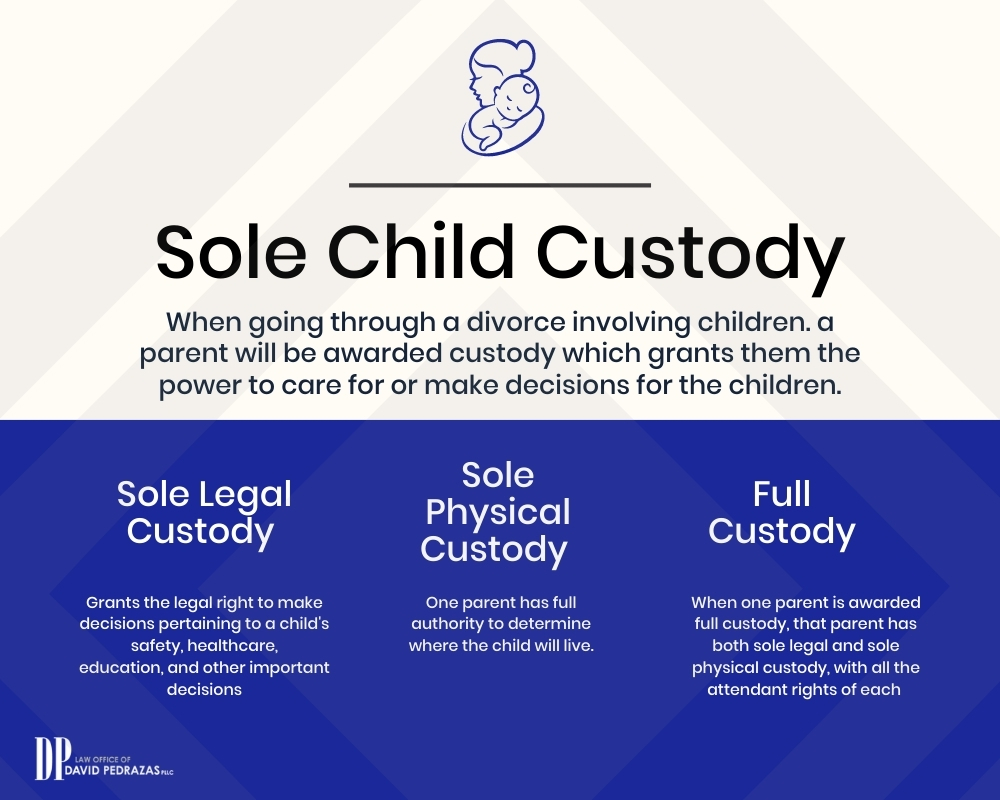The two forms of child custody are physical custody and legal custody. Physical custody determines where a child will live, and legal custody determines which parent will make the important decisions about the child’s education, health care, religion, and matters of the child’s general well-being. For one parent to get sole custody and child support involves a number of considerations by the court. Let’s look at those considerations.
Contents on this page:
- Types of Child Custody
- How Does Sole Legal Custody Work?
- Sole Custody and Relocation
- How Do Courts Decide Sole Physical and Sole Legal Custody?
- The Child’s Desire Regarding Custody
- Protecting Your Parental Rights and Your Child’s Interests
- Best Custody Lawyer in Salt Lake City, Utah
Deciding child custody is one of the issues you deal with during the divorce process. Contact attorney David Pedrazas and we will help you defend your & your children’s rights.
How are Sole Physical Custody and Sole Legal Custody Different?
In a divorce, the court may grant one of a child’s parents sole legal custody and/or sole physical custody. But, what does sole custody mean? These are the basic parental rights awarded to both the custodial and non-custodial parent under one of the types of sole custody orders from the court.
Sole Legal Custody — The parent with sole legal custody is granted the legal right to make all decisions about the child’s safety, health, education, religion, childcare, and other matters. Child support to be paid to the custodial parent is addressed along with sole physical custody decisions by the court. The court grants the non-custodial parent the right to be informed by the custodial parent about those major decisions.
Sole Physical Custody — One parent has full authority to determine where the child will live. The court often grants the non-custodial parent time to spend with their child(ren).
FULL CUSTODY — When one parent is awarded full custody, that parent has both sole legal and sole physical custody, with all the attendant rights of each of those forms of sole custody.
How Does Sole Legal Custody Work?
There are the basic parental rights awarded to both the custodial and non-custodial parent under each of the types of custody listed above. As mentioned, the parent with sole legal custody is granted the legal right to make all major decisions about the child’s upbringing and well-being.
The court grants the non-custodial parent the right to be informed by the custodial parent about those major decisions. The judge will also normally grant the non-custodial parent time to spend with his or her child(ren).
Child support to be paid by the non-custodial to the custodial parent is addressed along with the sole physical custody decision by the court. There is a child support worksheet and calculation used by courts in Utah to determine the necessary amount of child support to be paid.
Sole Custody and Relocation
A parent who is awarded sole legal and sole physical custody of a minor child still does not have the legal right to relocate without approval from the court. The court reviews relocation plans, to ensure that relocating does not adversely impact parent-time for the noncustodial parent. The judge typically issues a temporary order to maintain current arrangements while the case is being decided so that children are not negatively affected.
When the custodial parent relocates, the parties can work together to develop custody and/or parent time arrangement. The court may issue an order for the arrangement if it is judged to be in the best interest of the child. Utah custody law provides detailed guidelines for these arrangements, including parent-time schedules.
The state law further provides guidelines for child custody arrangements when one parent is an active military member and is deployed to a remote location.
How Do Courts Decide Sole Custody and Child Support?
Utah courts order custody arrangements that judges believe to serve the best interests of children. As mentioned, under normal circumstances, state law prefers joint custody. But, in some cases, the court finds that there is reasonable cause to order sole custody, which, again, includes sole physical and/or sole legal custody, to one parent.
The Utah Courts website contains a published list of general factors, as listed in the section below. The court weighs these many factors in deciding how a child’s best interest is served in custody cases. The court does not decide custody based on a preference between the respective parents’ genders.
When sole custody is presented by one party as the best outcome for the child, predictably the other party will present strong arguments opposing the loss of opportunity to share custody.
As explained earlier, after the court determines that the sole physical custody arrangement is in the best interest of the child, child support is then calculated based on a range of the non-custodial parent’s financial factors.
Expect Strong Objections in Court to Sole Custody
Under Utah Code 30-3-10, the court’s entire guiding principle for judges’ rulings in custody cases is deciding in the child’s best interest. Joint legal custody is normally the court’s judgment. There are exceptions. When a judge’s review of many factors listed in Utah 30-3-10, such as the examples below reveal that joint custody is not the best outcome, it may be determined that sole custody is in the child’s best interest:
- The parents live a long distance apart.
- The child has special needs.
- There has been child neglect by one of the parents.
- History of physical violence against the child or the ex-spouse
- There has been physical, emotional, or sexual abuse involving the child.
- There has been physical, emotional, or sexual abuse involving a parent or one of the parent’s household members.
- There is a history of unstable mental health
- There is a history of drug or alcohol abuse
- There is any other factor that the judge finds relevant in deciding custody, due to which it may be determined that sole custody is in the best interest of the child.
Overcoming Objections to Granting Sole Custody
In order to overcome the automatic assumption by the court that joint legal custody is in the best interest of a child, the parent needs to show that sole legal custody is actually in the child’s best interest. (This assumption does not apply to joint physical custody.)
Additional general factors that the court examines to determine the child’s best interest in the custody decision include those on this list that are relevant in your case, among other possible considerations:
- A parent’s moral conduct
- A parent’s financial conduct
- The history and nature of each parent’s relationship with the child
- Each parent’s level of desire and ability to care for the child
- The parents’ willingness to foster ongoing engagement between the child and the other parent, (acknowledging any necessary protective actions)
- The child’s relationships with people in the parent’s life who may impact the child’s best interests
- The comparative benefits of having siblings living together
- Any other considerations the court finds relevant
The Child’s Desire Regarding Custody
The court can also take the desires of a child who is age 14 or older into consideration in a custody decision, but those desires are not the controlling issue and are viewed as only one factor. So, if the judge is considering joint physical or legal custody or both, the court will assess whether joint physical or legal custody can be expected to benefit the child.
The court will consider the respective parents’ abilities to treat the child’s welfare as his or her first priority, and their ability to cooperate in reaching decisions about the child’s best interest, and other matters of necessary co-parenting skills to make joint custody work appropriately to serve the child’s best interest. The court’s concerns will include:
- Each parent’s ability to communicate appropriately with the child’s other parent
- Each parent’s capability of cooperating with the other and make joint decisions
- Each parent’s apparent level of maturity
- The parent’s ability and will to protect the child from effects of conflict between the parents
- Each parent’s capability for encouraging sharing love and affection
See Utah 30-3-10.2 for a more detailed list of factors considered in child custody cases.
Protecting Your Parental Rights and Your Child’s Interests
One attorney cannot feasibly represent both parties in a divorce, child custody, and child support process. You need your own lawyer. As you can see, winning sole custody can be a highly complex challenge. You need the top child custody lawyer in Salt Lake City to present the best possible case for you. In fact, you’ll need the top child support attorney too, to ensure that all your parental rights and your child’s best interests are fully protected during a divorce in Utah.
Attorney David Pedrazas, Salt Lake City Utah
Of course, your child(ren)’s best interest is your top priority as you are going through your divorce. If you are concerned about how to get sole custody in your child’s best interest, we’re here to help you through this difficult process. You can have peace of mind knowing that your custody case is being handled by the best custody lawyer Utah can offer you.
David Pedrazas has helped many people in the Salt Lake area through child custody cases over the past 20 years. He has been recognized as one of Salt Lake City’s best divorce attorneys by the National Academy of Family Law Association, the American Institute of Family Law, and the American Academy of Trial Attorneys.


